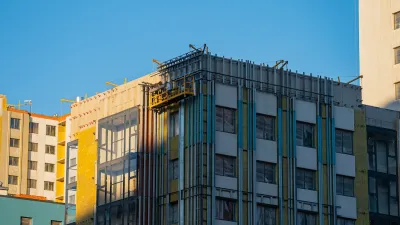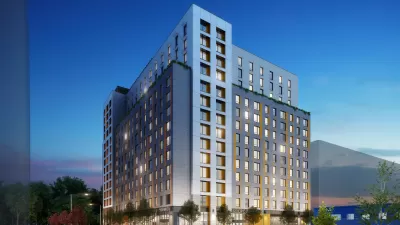Fresh interest in green building among investors, new incentives, and stricter building codes are making it more possible to include green building practices in affordable housing production.

Until recently, housing developers often faced a choice between lower building costs and a lower carbon footprint. “Simply put, the lower the carbon footprint, the higher the cost to build.” But now, writes Allen Feliz, “Thanks to a combination of incentives, the growing popularity of ESG investing and stricter building codes, affordable housing and decarbonization are no longer mutually exclusive.”
As Feliz notes, “Incentives defray costs for both new construction and retrofits. Fannie Mae and Freddie Mac, for example, have robust programs for green financing.” Meanwhile, “Innovations in the works should make decarbonization initiatives and sustainable building less costly. Ravi Malhotra, founder and president of ICAST, offers the example of heat pumps that provide more efficient cooling, space heating and water heating.”
According to the article, ESG (Environmental, Social, and Governance) investing is one boon to green building. “Notably, many of the most prominent investors and lenders in the affordable housing space have strict ESG mandates that influence their funding decisions.” In the near future, “Developers and investors may eventually have no choice but to decarbonize their portfolios and build sustainably, thanks to ever-stricter building codes. California has a Green Building Standards Code. New York City has implemented Local Law 97, which limits operational carbon emissions. Boston has enacted BERDO 2.0, which requires large buildings to reduce their energy and water use.”
Feliz points to a development in Garfield Park, Chicago, built by Preservation of Affordable Housing (POAH) that will met Passive House standards, a set of strict sustainability guidelines, as one example of how sustainable building and affordable housing can coexist.
FULL STORY: Affordable Housing and Decarbonization Are No Longer Mutually Exclusive

Planetizen Federal Action Tracker
A weekly monitor of how Trump’s orders and actions are impacting planners and planning in America.

Restaurant Patios Were a Pandemic Win — Why Were They so Hard to Keep?
Social distancing requirements and changes in travel patterns prompted cities to pilot new uses for street and sidewalk space. Then it got complicated.

Map: Where Senate Republicans Want to Sell Your Public Lands
For public land advocates, the Senate Republicans’ proposal to sell millions of acres of public land in the West is “the biggest fight of their careers.”

Maui's Vacation Rental Debate Turns Ugly
Verbal attacks, misinformation campaigns and fistfights plague a high-stakes debate to convert thousands of vacation rentals into long-term housing.

San Francisco Suspends Traffic Calming Amidst Record Deaths
Citing “a challenging fiscal landscape,” the city will cease the program on the heels of 42 traffic deaths, including 24 pedestrians.

California Homeless Arrests, Citations Spike After Ruling
An investigation reveals that anti-homeless actions increased up to 500% after Grants Pass v. Johnson — even in cities claiming no policy change.
Urban Design for Planners 1: Software Tools
This six-course series explores essential urban design concepts using open source software and equips planners with the tools they need to participate fully in the urban design process.
Planning for Universal Design
Learn the tools for implementing Universal Design in planning regulations.
Heyer Gruel & Associates PA
JM Goldson LLC
Custer County Colorado
City of Camden Redevelopment Agency
City of Astoria
Transportation Research & Education Center (TREC) at Portland State University
Camden Redevelopment Agency
City of Claremont
Municipality of Princeton (NJ)





























